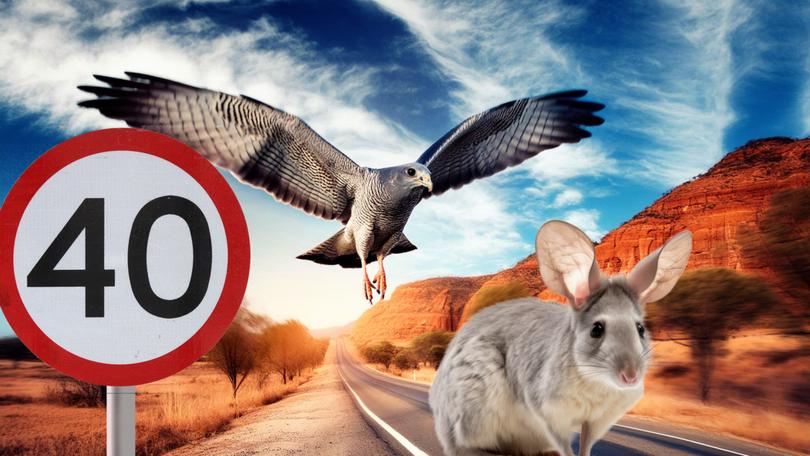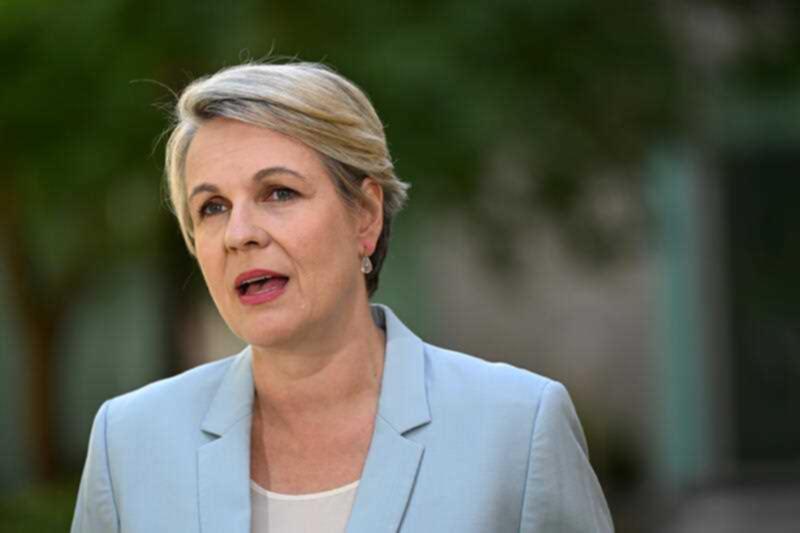NATURE POSITIVE: Full details of Government’s proposed 40km/h outback speed limits plan revealed
SECRET GREEN FILES: Speed limits tailored to different threatened animals, noise limits and underpasses were suggested under a radical proposal to re-write nature rules, secret documents reveal.

Speed limits tailored to different threatened animals, noise limits and underpasses were suggested under a radical proposal to re-write nature rules in Australia’s resources powerhouse, secret documents reveal.
Canberra bureaucrats recommended a dusk-to-dawn speed limit of 40km/h to protect the Greater Bilby and speed restrictions between 9am-3pm to avoid collisions with the Grey Falcon during the bird’s foraging times.
To avoid disturbing the Ghost Bat it recommended mining operations keep noise levels to 70 decibels — the equivalent of a vacuum cleaner.
Sign up to The Nightly's newsletters.
Get the first look at the digital newspaper, curated daily stories and breaking headlines delivered to your inbox.
By continuing you agree to our Terms and Privacy Policy.Animal “underpasses” were among other “mitigation measures” pushed as part of the draft Pilbara Bioregion plan, drawn up inside the federal Environment Department to guide development in the lucrative mining region.
The most controversial suggestion — 40km/h speed limits in a region full of 110km/h highways — was exclusively revealed by The Nightly in March, enraging miners and fuelling the campaign against Labor’s wider Nature Positive agenda.
The Pilbara Bioregion plan was not linked to Nature Positive but rather a separate attempt to streamline assessments in the region.
Changes to speed limits in the Pilbara would risk wiping billions off the Australian economy by cutting productivity in the nation’s mining engine room.
Environment Minister Tanya Plibersek killed off the bureaucrats’ idea as soon as it crossed her desk and has indicated there are no plans to revive it.
She has since split up the Nature Positive package, putting new national environment standards on the back burner while pushing ahead with a federal EPA.
While the Federal Government is not entertaining the Pilbara Bioregion plan, the 106-page draft document offers valuable insight into the thinking of the public servants working to overhaul the nation’s environmental laws.
Opposition leader Peter Dutton this week promised his own region-wide planning regime to streamline project assessments, reviving a Turnbull-era policy that covered areas including the NT’s Beetaloo Basin.
The department’s draft policy — obtained in full by The Nightly — was designed to promote “ecologically sustainable development” in the Pilbara to ensure threatened species were not put further at risk.

It set guidelines to avoid disturbing critical habitat.
For example, if a Northern quoll female was detected in a survey then all habitats within a 640-metre radius should be avoided.
The policy also recommended “mitigation measures” to protect the nine listed species from a serious of threats — including the risk of being hit by a truck or train.
It outlined that the measures should be incorporated into the project’s design when submitted for assessment.
For the Greater Bilby, it said a dusk-to-dawn speed limit of 40km/h should be “implement(ed) and enforc(ed)” on any roads near the “avoidance area”.
To limit the threat to the Grey Falcon, it recommended “appropriate” speed limits be enforced during the foraging times between 9am and 3pm.
The document suggested the recommendation was based on an academic study that reported six cases of Grey Falcons being found dead or injured along roads between 2007 and 2017.
As part of measures to protect the Pilbara olive python, the department suggested building “fauna underpasses” on the roads.
The policy — if implemented — could have had implications for green energy projects.
It said no wind turbines should be built in known Grey Falcon flight paths and avoided in areas used by the Ghost bat.
In a statement to The Nightly, a department spokeswoman said the Pilbara plan was intended to streamline assessment under existing environmental protection laws and was not linked to the wider Nature Positive Plan.
“However, we appreciate that the timing of the release of the consultation draft has led to unnecessary confusion and for this reason, the Minister has made the decision not to progress the draft policy at this time,” the spokesperson said.
Labor is still intending to pursue regional plans under the third tranche of Nature Positive.
